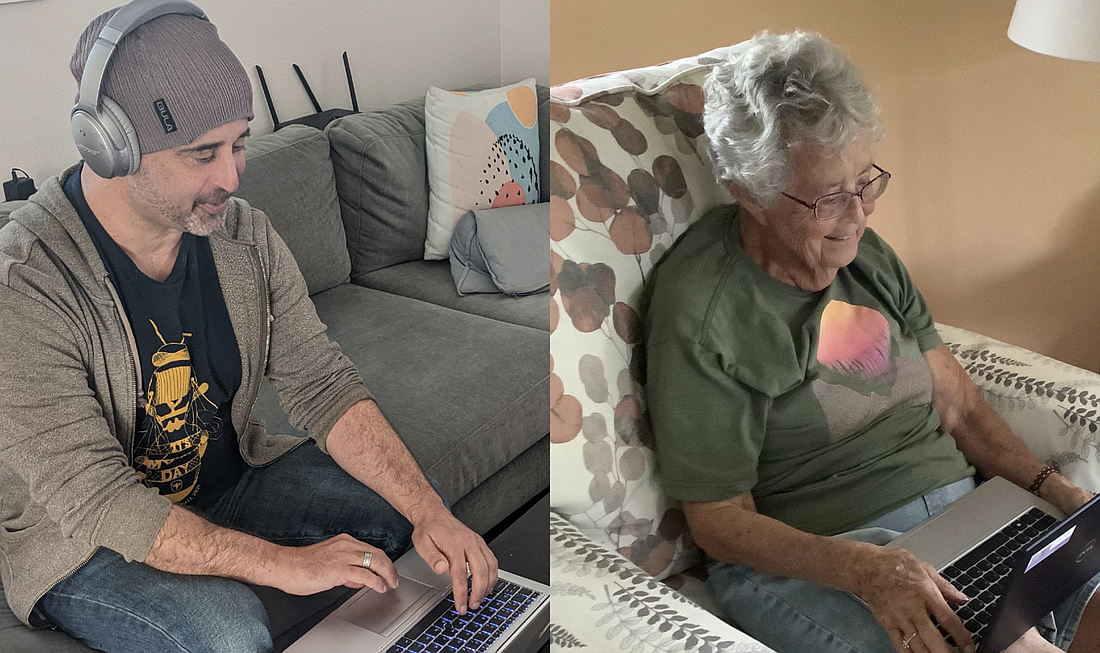- November 23, 2024
-
-
Loading

Loading

Despite a physical distance of over 1,000 miles, one Ormond Beach woman and her son have never felt more connected. And it all started with the COVID-19 pandemic and an abundance of acrostic puzzles.
At 8 or 9 years old, Peter Galea recalls receiving monthly issues of Games Magazine, and he and his mother, Judy Eaton, would do puzzles together, long before the internet granted access to such things with the click of a mouse. A love of word puzzles has always been a shared passion, and Eaton said that Galea often claims his parents made him play Scrabble before he knew what letters were, but that might be a stretch. Still, almost four decades later, puzzles are what brought them closer in the middle of a global pandemic when so many were feeling isolated.
Galea, now 47, had the idea back in March 2020 to complete one of New York Times' acrostic puzzles online every day with his mother as a way to make sure neither would get lonely during the initial shutdowns. A software engineer in Austin, Texas, Galea ensured his 83-year-old mother in Ormond Beach downloaded the software AnyDesk on her computer so that she could see him typing in the answers to the acrostics as they spoke on the phone.
Now, the pair have completed all of the available acrostic puzzles by the New York Times since 1999. That's over 550 puzzles.
“It’s kind of cool," Galea said. :We didn’t set it out this way. We thought it was going to be a temporary thing as the pandemic started — two weeks or a month or whatever — but we’ve just really enjoyed it. As the quarantines have ebbed and flowed and things like that, we’ve just kind of kept going.”
For Eaton, it's been a wonderful way to communicate.
“Even though he’s in Texas and I’m in Florida, we’re more connected than we have been, and we both love puzzles — we’ve always done them individually, so it’s a perfect thing to be doing together," she said.
What makes acrostic puzzles different from your average crossword?
An acrostic involves figuring out a quote by using crossword-style clues, where each letter in the quote corresponds to a letter in one of the clues. The more clue answers you figure out, the more letters you'll reveal in the quote.
“It’s kind of real nice back and forth process, jumping between the clues and the quotes, and we’ve always just kind of enjoyed that — the using of two different skills to solve the puzzle," Galea said.
The New York Times' acrostic puzzles are available online, starting with the Sept. 12, 1999 puzzle, and are published bi-weekly. When Galea and Eaton got started, they never thought they would finish them all, but on Monday, Jan. 10, they finally caught up.
Each of them have their own areas of expertise that helps solve the clues in the puzzles. Galea is well-versed in the computer science and technology side of things, and Eaton is really good with biology.
“So we each have a trove of useless facts that occasionally are very helpful," Eaton said.
As they reached the end, she worried about their daily conversations coming to an end when there were no more puzzles to solve, but Galea reassured her he had no plans on stopping. They would just need to find a different kind of puzzle — maybe the puns and anagrams or the cryptic crossword.
“I genuinely just enjoy hanging out with my mother,” he said laughing. “It’s been really nice doing something fun together.”
Their communication wasn't always as constant as it is today.
Galea lived in Thailand as a scuba diving instructor for 7 years, and the conversations he was able to have with his mother were few and far between. The different time zones posed a difficult, and so did the spotty internet.
So when the uncertainty of the pandemic was setting in, and Galea suggested doing daily puzzles together, Eaton felt grateful. With her volunteering at AdventHealth Daytona Beach and Meals on Wheels, and her mahjong playing groups, coming to a pause, it beat doing puzzles alone in her home during the shutdowns.
"He’s my only son, so you know, there’s a lot of pressure on him but I knew I was just very grateful that he was going to do this," she said. "It seemed like a big gift.”
Galea also spends time every day playing online cribbage with his father, who lives in Miami. It's a little way to connect with his parents, but it's made a difference.
“It’s too bad it took a pandemic to get that to happen, but it’s certainly been a silver lining of the pandemic," he said.
Galea said he looks forward to the activity every day — to hear how his mom is doing, and what her day has been like so far.
“I guess doing a crossword puzzle is sort of a silly little thing, but it’s just some little activity, and it takes 15 minutes, and it’s something fun," Galea said. "It gives a little bit of routine to the day as well, and it gives some connection. If you can find something like that, like my mom and I have, then I would recommend it.”